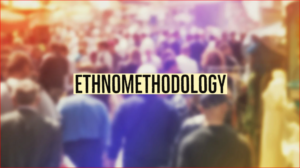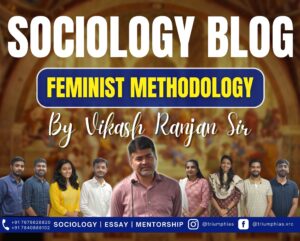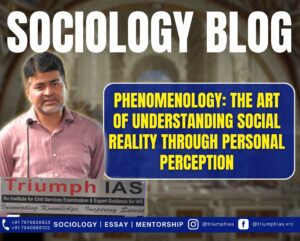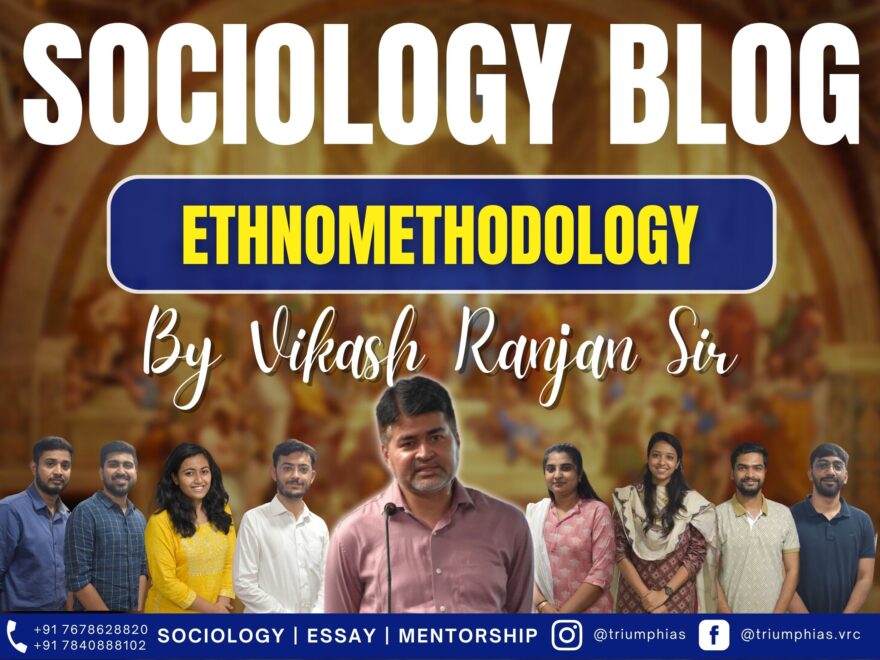Ethnomethodology
(Relevant for Sociology Optional for Civil Services Examination)

Introduction
In 1967, the term ‘Ethnomethodology’ was initially created by Harold Garfinkel. Ethnomethodology refers to an examination of the techniques people utilize. It delves into the strategies that individuals employ to create, justify, and infuse significance into their social environment.
Social Order as a Convenient Fiction:
- Social existence seems orderly to society’s members solely because they actively partake in understanding social life. Societies exhibit regular and systematic patterns only because members perceive them as such.
- Thus, social order transforms into a convenient fiction – a facade of order that society’s members construct.
- This semblance allows the social world to be characterized, elucidated, and thus rendered knowable, rational, comprehensible, and accountable to its participants.
- This accountability enables society’s members to furnish descriptions and explanations of their own behaviors, and the community surrounding them, that are logical and acceptable to both themselves and others. For instance, in Atkinson’s investigation of suicide, coroners could rationalize and clarify their decisions based on common-sense methods they employed to reach a verdict.
- Zimmerman and Wieder (1984) state that Ethnomethodology’s purpose is to clarify ‘how society’s members go about perceiving, describing, and justifying order in the world where they reside.
The Documentary Method:
- This method involves treating an actual appearance as a representative document of an assumed underlying pattern. The underlying pattern is extracted from its individual documentary pieces of evidence, and these individual evidences are interpreted according to ‘what is known’ about that underlying pattern.
- Garfinkel contended that he demonstrated the documentary method and its reflexivity through an experiment carried out in a university’s psychiatry department.
Indexicality:
- Indexicality implies that an object or activity’s meaning is derived from its context; it is associated with a specific situation.
- Therefore, any interpretation or explanation made by members in their daily lives refers to distinct circumstances and scenarios.
- Contrary to viewing the individual as a ‘cultural dope,’ Ethnomethodologists see a skilled member constantly paying attention to the unique, indexical qualities of situations, interpreting them, making them comprehensible, communicating this understanding to others, and forming an appearance of order.
- Ethnomethodologists assert that the social world consists solely of its members’ constructs, interpretations, and descriptions. It becomes the sociologist’s task to elucidate the methods and accounting techniques members use to shape their social environment – a task that mainstream sociology is accused of neglecting.
A Critique:
- Alvin Gouldner (1971) criticized ethnomethodology for concerning itself with the trivial facets of social life and for uncovering things already known to all.
- As noted by Anthony Giddens (1977), there appears to be scant reference to the pursuit of practical objectives or interests, such as what motivated the students in Garfinkel’s counseling experiment.
- Critics have posited that Ethnomethodologists have overlooked the fact that members’ accounting procedures occur within a framework of social relationships that include disparities in power.
- Several Ethnomethodologists seem to disregard anything not acknowledged and accounted for by society’s members. They suggest that, if members do not acknowledge the existence of objects and events, they are unaffected by them.

To master these intricacies and fare well in the Sociology Optional Syllabus, aspiring sociologists might benefit from guidance by the Best Sociology Optional Teacher and participation in the Best Sociology Optional Coaching. These avenues provide comprehensive assistance, ensuring a solid understanding of sociology’s diverse methodologies and techniques.
META TAGS: Ethnomethodology, Harold Garfinkel, Social Order, Indexicality, Documentary Method, Convenient Fiction, Social World, Sociology, Interpretation, Social Relationships, Mainstream Sociology, Power Differences, Cultural Dope, University Department of Psychiatry, Atkinson’s Study of Suicide, Zimmerman and Wieder, Alvin Gouldner, Best Sociology Optional Coaching, Sociology Optional Syllabus, Ethnomethodology, Harold Garfinkel, Ethnomethodology, Harold Garfinkel, Ethnomethodology, Harold Garfinkel, Ethnomethodology, Harold Garfinkel, Ethnomethodology, Harold Garfinkel, Ethnomethodology, Harold Garfinkel, Ethnomethodology, Harold Garfinkel, Ethnomethodology, Harold Garfinkel,
 |
 |
Explore Sociology Optional Syllabus
Paper-1
FUNDAMENTALS OF SOCIOLOGY
- Sociology – The Discipline
- Sociology as Science:
- Research Methods and Analysis:
- Sociological Thinkers:
- Karl Marx- Historical materialism, mode of production, alienation, class struggle.
- Emile Durkheim- Division of labour, social fact, suicide, religion and society.
- Max Weber- Social action, ideal types, authority, bureaucracy, protestant ethic and the spirit of capitalism.
- Talcott Parsons- Social system, pattern variables.
- Robert K. Merton- Latent and manifest functions, conformity and deviance, reference groups.
- Mead – Self and identity.
- Stratification and Mobility:
- Concepts- equality, inequality, hierarchy, exclusion, poverty and deprivation.
- Theories of social stratification- Structural functionalist theory, Marxist theory, Weberian theory.
- Dimensions – Social stratification of class, status groups, gender, ethnicity and race.
- Social mobility- open and closed systems, types of mobility, sources and causes of mobility.
- Works andEconomic Life:
- Social organization of work in different types of society- slave society, feudal society, industrial /capitalist society
- Formal and informal organization of work.
- Labour and society.
- Politics and Society:
- Sociological theories of power.
- Power elite, bureaucracy, pressure groups, and political parties.
- Nation, state, citizenship, democracy, civil society, ideology.
- Protest, agitation, social movements, collective action, revolution.
- Religion and Society:
- Sociological theories of religion.
- Types of religious practices: animism, monism, pluralism, sects, cults.
- Religion in modern society: religion and science, secularization, religious revivalism, fundamentalism.
- Systems of Kinship:
- Family, household, marriage.
- Types and forms of family.
- Lineage and descent.
- Patriarchy and sexual division of labour.
- Contemporary trends.
- Social Change in Modern Society:
- Sociological theories of social change.
- Development and dependency.
- Agents of social change.
- Education and social change.
- Science, technology and social change.
Paper-2
INDIAN SOCIETY: STRUCTURE AND CHANGE
INTRODUCING INDIAN SOCIETY
- Perspectives on the study of Indian society:
- Indology (GS. Ghurye).
- Structural functionalism (M N Srinivas).
- Marxist sociology (A R Desai).
- Impact of colonial rule on Indian society :
- Social background of Indian nationalism.
- Modernization of Indian tradition.
- Protests and movements during the colonial period.
- Social reforms.
SOCIAL STRUCTURE
- Perspectives on the study of Indian society:
- The idea of Indian village and village studies.
- Agrarian social structure – evolution of land tenure system, land reforms.
- Caste System:
- Perspectives on the study of caste systems: GS Ghurye, M N Srinivas, Louis Dumont, Andre Beteille.
- Features of caste system.
- Untouchability – forms and perspectives.
- Tribal communities in India
- Definitional problems.
- Geographical spread.
- Colonial policies and tribes.
- Issues of integration and autonomy.
- Social Classes in India:
-
- Agrarian class structure.
-
-
- Industrial class structure.
- Middle classes in India.
-
- Systems of Kinship in India:
- Lineage and descent in India.
- Types of kinship systems.
- Family and marriage in India.
- Household dimensions of the family.
- Patriarchy, entitlements and sexual division of labour
- Religion and Society:
- Religious communities in India.
- Problems of religious minorities.
- Patriarchy, entitlements and sexual division of labour
SOCIAL CHANGES IN INDIA
- Visions of Social Change in India:
- Idea of development planning and mixed economy
- Constitution, law and social change.
- Education and social change.
- Rural and Agrarian transformation in India:
- Programmes of rural development, Community Development Programme, cooperatives,poverty alleviation schemes
- Green revolution and social change.
- Changing modes of production in Indian agriculture.
- Problems of rural labour, bondage, migration.
3. Industrialization and Urbanisation in India:
-
- Evolution of modern industry in India.
- Growth of urban settlements in India.
- Working class: structure, growth, class mobilization.
- Informal sector, child labour
- Slums and deprivation in urban areas.
4. Politics and Society:
-
- Nation, democracy and citizenship.
- Political parties, pressure groups , social and political elite
- Regionalism and decentralization of power.
- Secularization
5. Social Movements in Modern India:
-
- Peasants and farmers movements.
- Women’s movement.
- Backward classes & Dalit movement.
- Environmental movements.
- Ethnicity and Identity movements.
6. Population Dynamics:
-
- Population size, growth, composition and distribution
- Components of population growth: birth, death, migration.
- Population policy and family planning.
- Emerging issues: ageing, sex ratios, child and infant mortality, reproductive health.
7. Challenges of Social Transformation:
-
- Crisis of development: displacement, environmental problems and sustainability
- Poverty, deprivation and inequalities.
- Violence against women.
- Caste conflicts.
- Ethnic conflicts, communalism, religious revivalism.
- Illiteracy and disparities in education.
Why Vikash Ranjan’s Classes for Sociology?
Proper guidance and assistance are required to learn the skill of interlinking current happenings with the conventional topics. VIKASH RANJAN SIR at TRIUMPH IAS guides students according to the Recent Trends of UPSC, making him the Best Sociology Teacher for Sociology Optional UPSC.
At Triumph IAS, the Best Sociology Optional Coaching platform, we not only provide the best study material and applied classes for Sociology for IAS but also conduct regular assignments and class tests to assess candidates’ writing skills and understanding of the subject.
Choose The Best Sociology Optional Teacher for IAS Preparation?
At the beginning of the journey for Civil Services Examination preparation, many students face a pivotal decision – selecting their optional subject. Questions such as “which optional subject is the best?” and “which optional subject is the most scoring?” frequently come to mind. Choosing the right optional subject, like choosing the best sociology optional teacher, is a subjective yet vital step that requires a thoughtful decision based on facts. A misstep in this crucial decision can indeed prove disastrous.
Ever since the exam pattern was revamped in 2013, the UPSC has eliminated the need for a second optional subject. Now, candidates have to choose only one optional subject for the UPSC Mains, which has two papers of 250 marks each. One of the compelling choices for many has been the sociology optional. However, it’s strongly advised to decide on your optional subject for mains well ahead of time to get sufficient time to complete the syllabus. After all, most students score similarly in General Studies Papers; it’s the score in the optional subject & essay that contributes significantly to the final selection.
“A sound strategy does not rely solely on the popular
Opinion of toppers or famous YouTubers cum teachers.”
It requires understanding one’s ability, interest, and the relevance of the subject, not just for the exam but also for life in general. Hence, when selecting the best sociology teacher, one must consider the usefulness of sociology optional coaching in General Studies, Essay, and Personality Test.
The choice of the optional subject should be based on objective criteria, such as the nature, scope, and size of the syllabus, uniformity and stability in the question pattern, relevance of the syllabic content in daily life in society, and the availability of study material and guidance. For example, choosing the best sociology optional coaching can ensure access to top-quality study materials and experienced teachers. Always remember, the approach of the UPSC optional subject differs from your academic studies of subjects. Therefore, before settling for sociology optional, you need to analyze the syllabus, previous years’ pattern, subject requirements (be it ideal, visionary, numerical, conceptual theoretical), and your comfort level with the subject.
This decision marks a critical point in your UPSC – CSE journey, potentially determining your success in a career in IAS/Civil Services. Therefore, it’s crucial to choose wisely, whether it’s the optional subject or the best sociology optional teacher. Always base your decision on accurate facts, and never let your emotional biases guide your choices. After all, the search for the best sociology optional coaching is about finding the perfect fit for your unique academic needs and aspirations.
META TAGS: Methodology in Sociology,Methodology in Sociology,Methodology in Sociology,Methodology in Sociology
Follow us :


https://t.me/VikashRanjanSociology
Find More Blogs
|
Scope of the subject and comparison with other social sciences |
|||
|
|
|
|
Modernity and social changes in Europe |


One comment